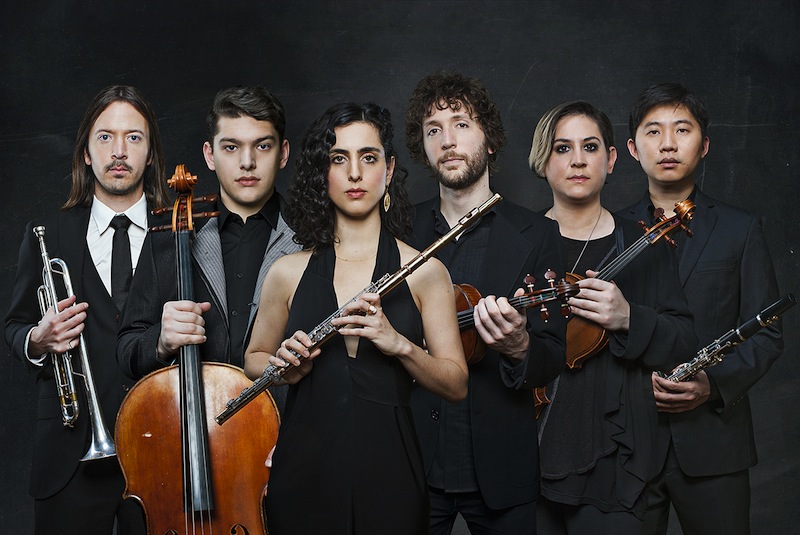yMusic serves up two world premieres in Carnegie debut

yMusic performed Friday night at Zankel Hall. Photo: Allan Amato
Over 250 years after Haydn launched the string quartet, the genre is still thriving. In 1912, Schoenberg’s Pierrot Lunaire used a slate of violin, cello, flute, clarinet, and piano, later spawning hundreds of works for that instrumentation. And the late 20th century produced further variations, such as the group eighth blackbird, which added percussion to the now-classic “Pierrot ensemble,” and successfully inspired many composers to write for that sextet.
In 2008, yMusic changed the game yet again, this time for the 21st century: an amplified sextet comprising a string trio (violin, viola, cello) and retaining the flute and clarinet. But instead of a piano came an outlier: a trumpet. (In opening remarks, violist Nadia Sirota joked, “We formed this group because we liked each other—not because it made any sense.”) Further, these adventurous musicians have made their reputation by sidestepping “traditional” classical, and collaborating with pop groups such as The Dirty Projectors, Bon Iver, The Staves, and others.
The ensemble made its Zankel Hall debut Friday night, an event that contributed two more world premieres as part of the 125 Commissions Project (2015-2020), celebrating Carnegie Hall’s 125th anniversary.
The first came from Pulitzer Prize-winner Caroline Shaw. Her Draft of a High-Rise concocts an appealing exercise in clouds of pizzicatos and skittering rhythms, all growing more feverish until the blaze of the closing pages.
Chris Thile’s 134 Eldridge, a nod to an address on Manhattan’s Lower East Side, sported textural variety, alternately propulsive and lyrical. Pizzicato sequences were interrupted by free-flowing solos and a droll little waltz, before the energy wound down to a peaceful major chord.
Two 2001 electronic tracks by Sufjan Stevens were performed. Year of the Dragon and Year of the Dog —respectively arranged by Nico Muhly and Rob Moose, the group’s violinist—were transformed with a pulsing beat from cellist Gabriel Cabezas, and Alex Sopp’s chirping piccolo. The results evoked a fascinating 2005 experiment by Alarm Will Sound, which released acoustic versions of electronic music by Aphex Twin.
Andrew Norman, recently in the news for winning the Grawemeyer Award, wrote Music in Circles (2012) on a hot day, after conceding to the distracting sounds of his air-conditioning unit. Faint harmonics grew in intensity alongside sputtering winds, until a Copland-like trumpet line rose over the thickets. As the texture thinned out into scratches and shimmers, the viola had the last word in a quiet, extended solo.
Two works by Son Lux, Eleven and a short suite called Paris, Memory Wounds, First (both from 2015), shared bubbling arpeggios and similar energy to his Beautiful Mechanical (2011), the title track of the group’s first recording. Sopp and clarinetist Hideaki Aomori were at their agile best in Missy Mazzoli’s Ecstatic Science (2016), with playful, scampering flourishes, combined with slow glissandos in the strings.
One of the most successful works heard Friday was an early hit, Judd Greenstein’s Clearing, Dawn, Dance (2010), featured on Beautiful Mechanical, the group’s first recording. A clarinet solo, inquisitively done by Aomori, ignited spritely gestures from the others, as rhythmic patterns combined in infectious cartwheels. Later a bass clarinet began a new round of vigorous fiddling and joyous density. As the night’s finale, it had most of the packed house on its feet.
Perhaps a few too many of the pieces relied on the same formula, albeit a satisfying one: strings offer scurrying scales or buzzing tremolos, the two winds ripple up and down, and then the trumpet—albeit given regal sonority by CJ Camerieri—arrives to sail over everything. But some of the night’s most effective moments were more subdued, such as Camerieri’s muted passages in Timo Andres’s Safe Travels (2013), a study in ascending and descending motifs to create perpetual motion, and a humorous nod to the musicians’ constantly finding themselves in airports.
There was time for an unusually satisfying encore, Epimetheus (2015) by Robert Sirota (yes, Nadia’s dad). Harnessing the typical yMusic energy, Sirota combined dissonance and rhythmic variety, for a giddy melánge flecked with wit and velocity.






